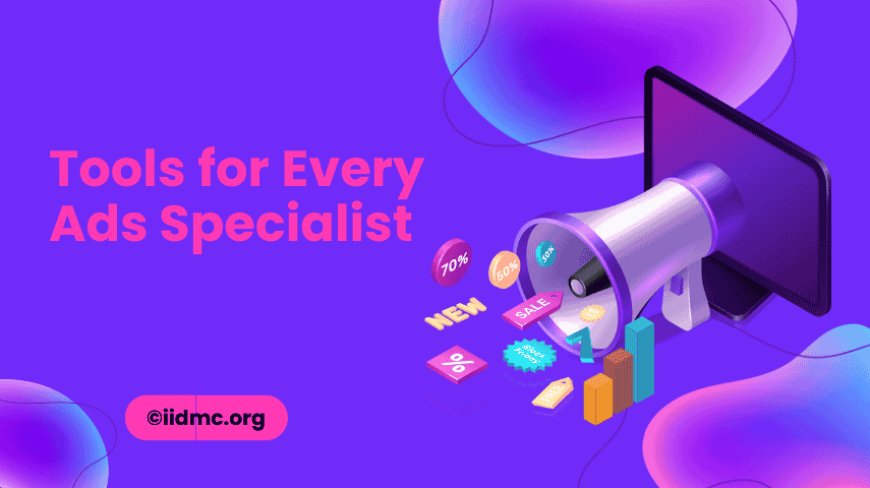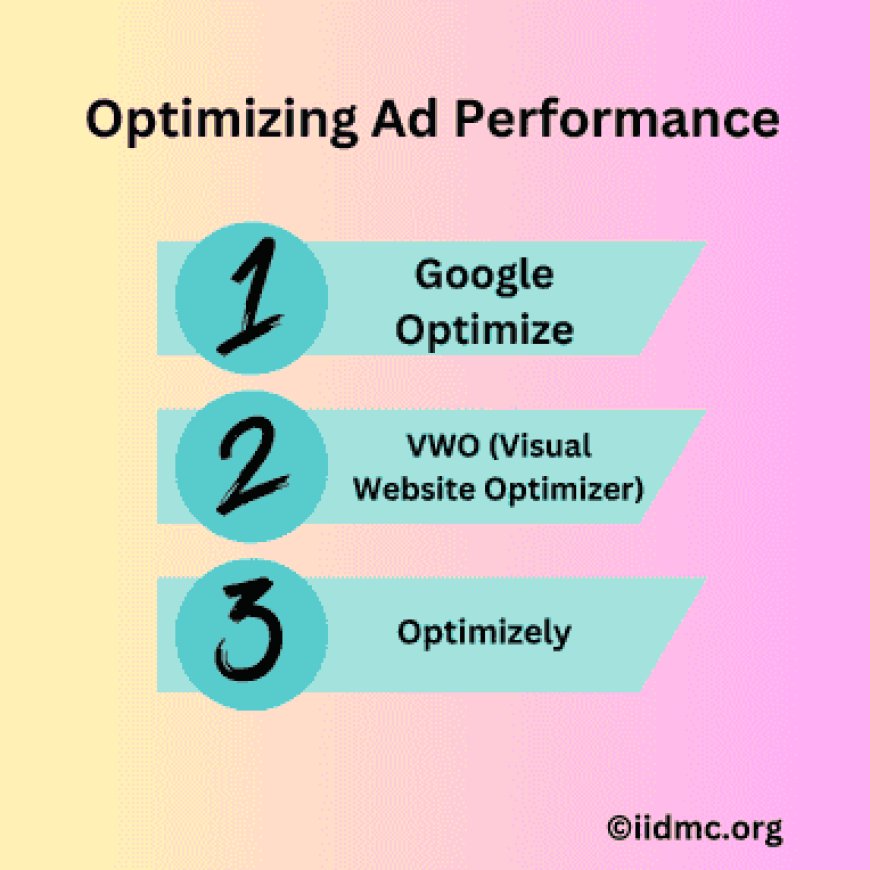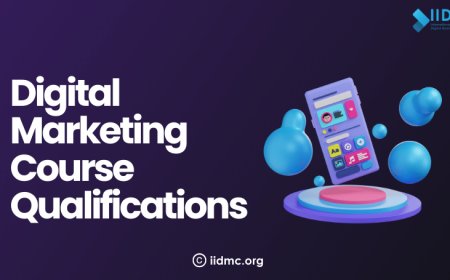Essential Tools for Every Ads Specialist
Discover the essential tools every ads specialist needs to optimize campaigns, analyze performance, and drive results across platforms. Boost your advertising strategy with the right resources for success.

As the digital advertising landscape continues to evolve, staying ahead of the competition requires more than just creativity and strategy — it demands the right tools. For an ads specialist, managing multiple campaigns, optimizing performance, and delivering measurable results can be overwhelming without a solid toolkit. Whether you’re running social media ads, pay-per-click (PPC) campaigns, or working with data analytics, having the essential tools at your fingertips can streamline your workflow, enhance productivity, and ultimately drive better outcomes. In this blog, we’ll dive into the must-have tools every ads specialist should know about to optimize their advertising efforts and succeed in today’s fast-paced digital environment.
Keyword Research Tools
Keywords are the foundation of search-based advertising, especially in platforms like Google Ads. Selecting the right keywords ensures your ads are shown to the right audience, improving visibility, click-through rates (CTR), and ultimately your return on investment (ROI). A well-executed keyword strategy can make or break the success of a search campaign.
Key Tools:
-
Google Keyword Planner: This is a basic yet essential tool for discovering search volumes, keyword suggestions, and cost estimates. It’s directly integrated with Google Ads, making it a go-to for many advertisers who need reliable data on what people are searching for.
-
Ahrefs / SEMrush: These are advanced tools for more in-depth keyword research and competitor analysis. They not only provide search volumes but also offer insights into keyword difficulty, competitor rankings, and traffic estimates, helping you make more strategic decisions.
-
Ubersuggest: A free alternative for generating keyword ideas and understanding search volume trends. While not as robust as some premium tools, Ubersuggest is a great resource for those starting out or for smaller campaigns with limited budgets.
Tips:
-
Focus on long-tail keywords to capture more specific search intents. These tend to have lower competition and can help you target users further down the buying funnel, leading to higher conversion rates.
-
Continuously monitor and refine your keyword strategy to adapt to changes in search trends and your competition's activities.
Ad Management Platforms
Ad management platforms are essential for streamlining the process of launching, managing, and optimizing campaigns. These platforms provide a centralized hub to control all aspects of your ads, from targeting and budgeting to performance tracking and reporting. Efficient use of these tools saves time, ensures more precise targeting, and allows for more effective optimizations.
Key Tools:
-
Google Ads / Bing Ads: These are the core platforms for managing search ads. Google Ads dominates the search landscape, while Bing Ads provides access to Microsoft’s search network, offering additional reach. Both platforms offer robust features for ad creation, targeting, and analytics.
-
Facebook Ads Manager: This tool enables you to manage campaigns on both Facebook and Instagram. With its advanced targeting options based on demographics, interests, and behaviors, it’s a powerful platform for reaching a highly specific audience.
-
LinkedIn Campaign Manager: Ideal for targeting a professional audience, LinkedIn’s ad platform is perfect for B2B advertisers. It allows you to target users based on job titles, industries, and company sizes, making it effective for reaching decision-makers and business professionals.
Tips:
-
Usage automation features such as smart bidding strategies and automatic budget adjustments to optimize your campaigns. Automation can help ensure that your ads perform well while reducing the manual workload.
-
Regularly review and analyze performance to fine-tune your targeting and budgets based on real-time data.
Audience Targeting and Analytics Tools: Maximizing Ad Impact
Understanding and refining your target audience is crucial for improving ad relevance, engagement, and overall performance. Accurate audience targeting ensures your ads reach the right people at the right time, leading to higher conversion rates and better return on investment (ROI).
Key Tools:
-
Facebook Audience Insights: A powerful tool to analyze demographics, interests, and behaviors of your target audience on Facebook, helping you create more personalized and effective ad campaigns.
-
Google Analytics: Tracks user behavior on your website, providing insights into which ads are driving conversions, and helps refine audience targeting based on site engagement.
-
HubSpot / Segment: Advanced tools for tracking the customer journey across multiple channels, enabling precise audience segmentation and personalized marketing efforts.
Tips for Better Audience Targeting:
-
Retargeting: Use retargeting strategies to re-engage users who have shown interest in your products but haven't converted yet, keeping your brand top-of-mind and improving conversion chances.
-
Lookalike Audiences: Build lookalike audiences to find new users who share characteristics with your best-performing customers.
-
Behavioral Segmentation: Segment your audience based on actions they’ve taken, such as purchases or content viewed, to deliver more relevant ads.
By using these tools and strategies, you can refine your audience targeting and use data based insights to optimize your ad performance.
Social Media Scheduling & Monitoring Tools
Managing the timing of ads across different platforms and maintaining engagement with your audience is crucial for a successful social media strategy. These tools allow you to plan and automate posts, monitor real-time engagement, and optimize your efforts across various social media channels. With the right tools, you can ensure consistent content delivery, track performance, and maintain a strong presence without manual intervention.
Key Tools:
-
Hootsuite / Buffer: These are popular tools for scheduling social media posts and monitoring ad engagement. They offer a straightforward way to schedule content across multiple platforms, track key performance metrics, and manage all your social accounts from a single dashboard.
-
Sprout Social: A more comprehensive platform for not only scheduling and monitoring but also offering detailed reporting on ad performance. It provides deeper insights into audience behavior and engagement, making it a robust choice for managing large-scale social campaigns.
Tips:
-
Coordinate organic posts with ad campaigns to maximize reach and engagement. When organic content supports paid campaigns, it creates a more cohesive brand presence, which can enhance overall effectiveness.
-
Use these tools to monitor conversations and interactions around your ads and brand, allowing for timely engagement and customer support, which can foster stronger connections with your audience.
Competitor Research Tools: Gaining a Strategic Edge
Why It’s Important:
Analyzing your competitors' ad strategies helps you stay ahead in the market. Understanding their approach to ads, SEO, and targeting enables you to identify opportunities, avoid their mistakes, and craft more competitive campaigns.
Key Tools:
-
SpyFu: A comprehensive tool for tracking competitors' Google Ads and SEO strategies, revealing their top keywords, ad spend, and more.
-
Adbeat: Uncover competitors' ad creatives, placements, and networks, offering insights into their display advertising strategies.
-
Moat: Provides visibility into the display and video ads that your competitors are running, allowing you to analyze their creative choices and formats.
Tips for Competitive Research:
-
Adapt, Don’t Imitate: Use competitor insights to inspire unique strategies, rather than copying their approach. Focus on standing out in the market.
-
Identify Gaps: Look for missed opportunities in your competitors' strategies—whether it's underused keywords, new audiences, or ad formats—to gain an edge.
-
Track Trends: Regularly monitor competitors' campaigns to keep up with evolving trends and refine your own ad tactics accordingly.
Effective competitor research equips you with the insights needed to outsmart the competition and optimize your advertising campaigns for success.
Reporting and Performance Tracking Tools: Ensuring Campaign Success
Consistently tracking key performance indicators (KPIs) is critical for ensuring your ad campaigns stay on track. By regularly monitoring performance data, you can make data-driven optimizations that improve ad effectiveness and maximize return on ad spend (ROAS).
Key Tools:
-
Google Data Studio: A free, customizable tool that allows you to create visually appealing, real-time ad performance reports. Perfect for easily sharing insights with teams or clients.
-
Supermetrics: Automates the process of pulling data from various ad platforms into Google Sheets or Data Studio, saving time on manual reporting.
-
Klipfolio: A robust tool for creating interactive, real-time dashboards that provide a clear overview of your ad performance metrics in one place.
Budget Management Tools
Staying on top of ad spending is crucial to ensuring that campaigns are cost-effective and within budget. Without proper budget management, it’s easy to overspend, which can significantly impact ROI. Budget management tools help track spending, optimize allocation, and prevent wasted ad spend, enabling you to get the most out of every dollar.
Key Tools:
-
AdEspresso: A user-friendly tool for managing ad budgets across multiple platforms, including Facebook, Instagram, and Google Ads. It provides detailed insights into spending and performance, allowing you to adjust budgets based on real-time results.
-
PPC Entourage: Specifically designed to optimize Amazon PPC budgets, this tool helps advertisers on Amazon keep their campaigns cost-efficient by identifying underperforming keywords, adjusting bids, and tracking budget utilization.
-
Shape.io: A platform that helps you manage PPC budgets across Google, Bing, and Facebook Ads. Shape.io provides automated budget tracking, spending alerts, and suggestions for optimizing your campaigns to stay within your predefined limits.
A/B Testing Tools: Optimizing Ad Performance
Why It’s Important:
A/B testing allows you to compare different versions of your ads, landing pages, or CTAs to determine which performs best. This iterative approach ensures that your campaigns are continually improving, leading to higher conversions, better user experiences, and maximized ad spend.
Key Tools:

-
Google Optimize: A free, easy-to-use tool that integrates with Google Ads and Google Analytics to run A/B tests on landing pages. Perfect for improving ad relevance and user experience.
-
VWO (Visual Website Optimizer): A comprehensive platform for A/B testing not just ads, but also websites, CTAs, and page elements. It offers heatmaps and session recordings to better understand user behavior.
-
Optimizely: A powerful experimentation platform that allows you to test different variations of your ads, websites, and apps to optimize user experiences and conversions.
Automation Tools
Why It’s Important:
Automation tools are essential for saving time and improving the efficiency of your campaigns. By automating repetitive tasks such as reporting, data syncing, and campaign management, you can focus on strategy and creative optimization, while ensuring your campaigns run smoothly and efficiently. Automation also reduces the risk of human error and provides faster, data-driven insights.
Key Tools:
-
Zapier: This tool automates workflows between different tools and platforms. Whether you're integrating your ad platforms with CRM systems, automating reports, or syncing data between apps, Zapier simplifies complex workflows, making campaign management more seamless.
-
Adalysis: Specially designed for PPC professionals, Adalysis automates tasks like audits, reporting, and providing optimization recommendations. It continuously monitors your campaigns and suggests improvements based on performance data, saving time and improving results.
-
Automate.io: Another powerful workflow automation tool that helps manage ads and sync data between platforms. Automate.io allows you to connect different apps, automate repetitive tasks, and streamline the management of your advertising and marketing processes.
Specialized tools are essential for boosting performance and efficiency in digital advertising. From ad creation to budget management and automation, the right tools help you run more effective campaigns. The key is finding a mix that fits your platforms and goals. As the digital landscape evolves, continuous learning and experimenting with new tools will keep you ahead of the competition.
To further enhance your expertise, consider exploring professional training and certifications through the International Institute of Digital Marketing™ (IIDMC) It’s a great resource for staying updated and advancing your career in digital marketing. Keep learning, keep optimizing, and let your toolkit drive results!





























